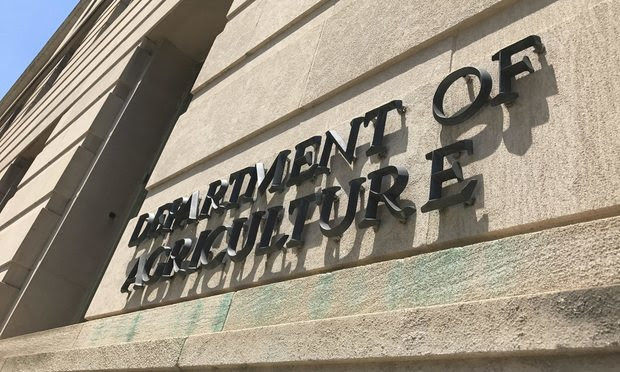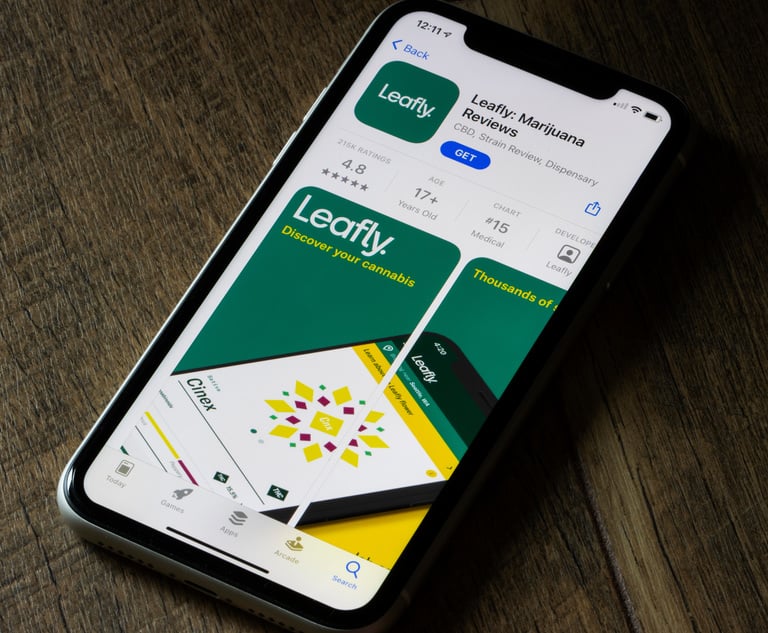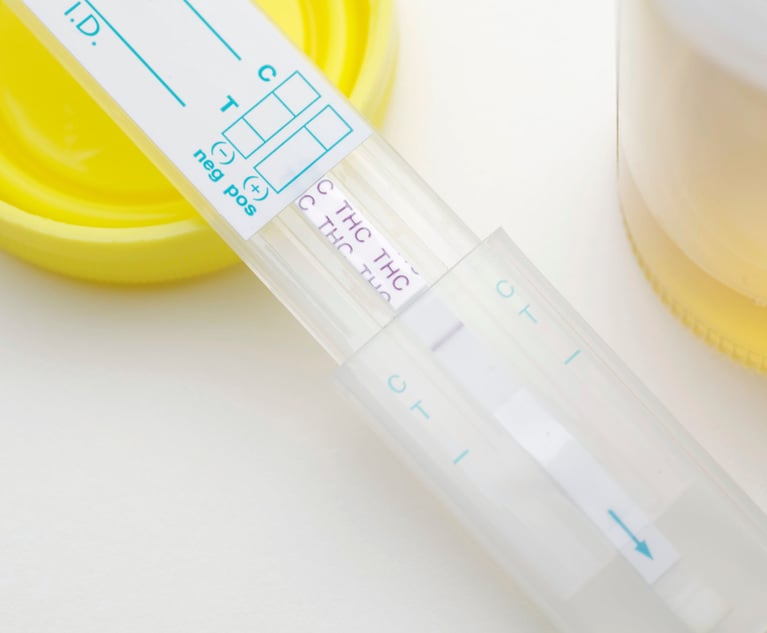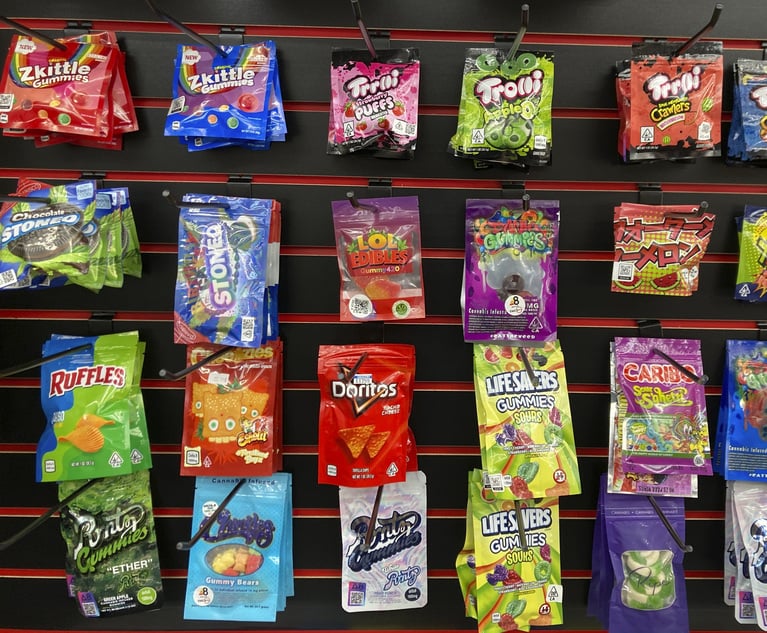Higher Law: A Sidley Partner's CBD Thoughts | USDA Hemp Guidance | Arizona Court Defines Medical Marijuana
Welcome to Higher Law -- our weekly roundup of news and analysis for cannabis industry lawyers. Thanks for reading!
May 30, 2019 at 04:00 PM
9 minute read
Welcome back to Higher Law, our weekly briefing on all things cannabis. I'm Cheryl Miller, reporting for Law.com from Sacramento.
This week, we talk to Coleen Klasmeier, a partner in Sidley Austin's Washington, D.C. office, about what to expect from the FDA's public hearing Friday on CBD. Plus, the U.S. Department of Agriculture's top counsel says states must open their borders to interstate hemp shipments. And the Arizona Supreme Court says medical marijuana means more than just dried flower.
Thanks so much for reading. Send me your thoughts, feedback and super (or even just good) story ideas at [email protected]. Or you can call at 916-448-2935. Follow me on Twitter @capitalaccounts.

Catching Up With a Sidley Partner About CBD
Tomorrow is the big day. The U.S. Food and Drug Administration hosts its first public hearing on CBD, inviting comments on how it should regulate the increasingly popular compound. Even though the FDA says the event won't produce any decisions or new policies, it's been on industry-watchers' calendars for months.
I checked in with Sidley Austin partner Coleen Klasmeier for her take on what to expect Friday. Klasmeier previously served in the FDA's Office of the Chief Counsel.
She describes the hearing as "one of the first early baby steps toward setting up policies addressing what is really a sort of unprecedented stress test to the FDA regulatory scheme—the sudden availability of a whole new category of ingredients from a previously prohibited botanical source. It's fascinating and it's going to take a long time and there's a ton of complexity. But we've got miles to go before we sleep."
And by miles to go, Klasmeier means potentially years, depending on what the regulatory goal is and whether Congress and a whole bunch of other agencies get involved.
"I think there are two options for policy makers," she says. "One is to recognize that there are some cross-currents here that are quintessentially of the type that Congress should address. Particularly you would think, oh, we've got economic values at stake. There are farmers who would benefit from taking advantage of this economic activity that's now legal. On the other hand you've got public health considerations that FDA is very skilled at addressing."
So what should we expect from tomorrow's hearing?
"One of those things I'll be looking for at hearing tomorrow is the degree to which participants in the hearing are putting real data on the table," Klasmeier says. "And my understanding from the external affairs team and the commissioner's office is that's how they selected people for the speaking slots, based on the likelihood that the speakers would provide data and information that would support regulatory action by the FDA. They need data and industry needs to cough it up.."
You can watch a webcast of the hearing here.

USDA's Published Hemp Guidance
Load up those hemp trucks—maybe.
In an opinion issued this week, Stephen Vaden, general counsel to the U.S. Department of Agriculture, said states and Indian tribes can't ban the interstate shipment of lawfully produced industrial hemp. That counts for both hemp grown in compliance with the 2018 Farm Bill and under the rules of a 2014 pilot hemp program, according to the opinion.
The USDA opinion thrilled officials at Colorado-based Big Sky Scientific. The CBD supplier is suing Idaho state police after officers in January seized a shipment of nearly 7,000 pounds of hemp on its way from Oregon to Colorado at a safety inspection site outside Boise. Attorneys for the state, where hemp is illegal, deemed the truck-trailer drug-related contraband. The company, whose lawyers include a team from Hogan Lovells, is appealing.
"The USDA ruling provides even more support to our efforts to have our shipment returned," Big Sky Scientific CEO Ryan Shore said in a prepared statement. "We believe the 9th Circuit Court of Appeal will rule in our favor and order release of our property."
Vaden said his office "does not concur" with the reasoning of Chief Magistrate Judge Ronald Bush of the U.S. District Court of Idaho, who denied Big Sky's request to return its hemp. Bush said the hemp could not have been legally produced under the 2018 Farm Bill because Oregon didn't have an approved hemp plan under the law at the time of shipment. Big Sky says that the hemp was grown lawfully under the 2014 law.
Idaho authorities contend that the state can still ban hemp shipments because the federal government hasn't yet created a regulatory system to oversee the 2018 law.
Arizona Supremes: Medical Marijuana Is More Than Just a Joint
The Arizona Supreme Court this week expanded the range of products residents can use under the state's nine-year-old medical marijuana law. In State v. Jones, the unanimous court said it was "implausible" that voters who approved the law only intended patients to be able to smoke dried flower.
"Such an interpretation would preclude the use of marijuana as an option for those for whom smoking or consuming those parts of the marijuana plants would be ineffective or impossible," Vice Chief Justice Robert Brutinel wrote.
The law allows for the consumption of marijuana extracts, too, the court held.
"Consistent with voter intent, our interpretation enables patients to use medical marijuana to treat their debilitating medical conditions, in whatever form best suits them, so long as they do not possess more than the allowable amount," Brutinel wrote.
The opinion vacates the conviction of Rodney Jones, a registered medical marijuana patient who was sentenced to 30 months in prison for possessing 0.050 ounces of hashish, a drug derived from cannabis resin, that he bought from a state-licensed dispensary.
Jones was represented by Robert Mandel and Taylor Young of Mandel Youngand by Lee Stein and Anna Finn of Mitchell Stein Carey Chapman.
"We are gratified that the Court upheld the will of the voters that patients would be allowed to use medical marijuana in whatever form works best for them," Mandel said in a prepared statement. "What is unfortunate is that Mr. Jones had to spend two-and-a-half years in prison based on a flawed interpretation of the Act."

Rohrabacher Will Advise Marijuana Ad Platform
Former California Congressman Dana Rohrabacher (above) has joined the marijuana ad platform BudTrader as an advisory board member. The long-time legalization supporter, who lost his re-election bid last year, will join existing board members DJ Lord of Cypress Hill and Public Enemy, former NFL player Marvin Washington, and four-time NBA champion John Salley.

In the Weeds…
>> Another business with marijuana ties has been denied bankruptcy protection. The U.S. trustee opposed a Detroit landlord's bankruptcy bid, in part, because its tenant was a dispensary—an illegal business under federal law. Courts, with one notable exception, continue to deny bankruptcy protection to debtors with connections to marijuana money. [Reuters]
>> Is Google putting the squeeze on Eaze and Weedmaps? Google has banned apps from its Play Store that "facilitate" the sale of marijuana. Google says apps that promote pot are fine but those that have an "in-app shopping cart feature" are a no-go. In a statement provided to The Verge, Google reps said the company is working with developers to help them stay compliant "without customer disruption." [The Verge]
>> RICO suits against cannabis operators have failed but they're still a threat. That's the conclusion of Saul Ewing Arnstein & Lehr associate Matthew Smith, who reviewed recent cases in Oregon, California and New York. "It seems inevitable that some plaintiffs will be able to prove a concrete financial injury to business or property and eventually succeed on RICO claims against industry participants," Smith writes. "Even if plaintiffs are only successful in surviving motions to dismiss, that alone would permit costly discovery and fees that may be enough to force expensive settlements or some companies out of business." [The Legal Intelligencer]
>> Out-of-state investors, welcome to Colorado! Gov. Jared Polis on Wednesday signed legislation ending the ban on publicly traded cannabis companies. Those companies already operate in Colorado, but the state restricts their ability to hold marijuana licenses, creating a "convoluted trail of ownership," The Denver Post reports. The law is expected to generate a new wave of mergers and acquisitions. [The Denver Post]
>> The pro-legalization Senate votes aren't there in New York. Gov. Andrew Cuomo said a newly amended recreational-use bill doesn't have the support to pass in the four weeks left in this year's legislative session. Assembly Majority Leader Crystal Peoples-Stokes was more optimistic, saying that passing a bill, which now includes expungement provisions, is "doable" in the final days of session. [New York Law Journal]

What's Next: The Calendar
June 4 - Reed Smith hosts the webinar "CANN201: Cannabis Coverage Concerns for Ancillary Businesses." Scheduled speakers are Reed Smith partner Michael Sampson; Martin Fox-Foster, director of claims at Emergent Risk Insurance Services; and Kirk Miller, cannabis practice leader at Emergent Risk.
June 4 - The International Cannabis Bar Association hosts a webinar, rescheduled from May 28, on the 2018 Farm Bill and retail CBD issues. Scheduled speakers are Vicente Sederberg partner Shawn Hauser, EARTH Law founding principal Courtney Moran, Robinson Law Group partner Frank Robinson and AroMed Aromatherapy president Lauren Andrews.
June 7-9 - Meadowlands, a gathering of cannabis industry leaders, takes place in Northern California. Bureau of Cannabis Control director Lori Ajax discusses the state of the industry on June 9. Dale Hunt, founder of Plant & Planet Law Firm, participates in a roundtable on preserving genetics and appellations of origin. San Francisco firm Hinman Carmichael hosts a shibori tie dye.
This content has been archived. It is available through our partners, LexisNexis® and Bloomberg Law.
To view this content, please continue to their sites.
Not a Lexis Subscriber?
Subscribe Now
Not a Bloomberg Law Subscriber?
Subscribe Now
NOT FOR REPRINT
© 2025 ALM Global, LLC, All Rights Reserved. Request academic re-use from www.copyright.com. All other uses, submit a request to [email protected]. For more information visit Asset & Logo Licensing.
You Might Like
View All
NY Cannabis Marketing Rulings / Rescheduling Effects / Honigman's Work on Trademark Suit / Goodbye
9 minute read
Workplace Weed and Labor Pacts / State AGs and Hemp / Maryland Licensing Suit / Vicente Sues Recruiter
9 minute readTrending Stories
- 1Public Notices/Calendars
- 2Wednesday Newspaper
- 3Decision of the Day: Qui Tam Relators Do Not Plausibly Claim Firm Avoided Tax Obligations Through Visa Applications, Circuit Finds
- 4Judicial Ethics Opinion 24-116
- 5Big Law Firms Sheppard Mullin, Morgan Lewis and Baker Botts Add Partners in Houston
Who Got The Work
J. Brugh Lower of Gibbons has entered an appearance for industrial equipment supplier Devco Corporation in a pending trademark infringement lawsuit. The suit, accusing the defendant of selling knock-off Graco products, was filed Dec. 18 in New Jersey District Court by Rivkin Radler on behalf of Graco Inc. and Graco Minnesota. The case, assigned to U.S. District Judge Zahid N. Quraishi, is 3:24-cv-11294, Graco Inc. et al v. Devco Corporation.
Who Got The Work
Rebecca Maller-Stein and Kent A. Yalowitz of Arnold & Porter Kaye Scholer have entered their appearances for Hanaco Venture Capital and its executives, Lior Prosor and David Frankel, in a pending securities lawsuit. The action, filed on Dec. 24 in New York Southern District Court by Zell, Aron & Co. on behalf of Goldeneye Advisors, accuses the defendants of negligently and fraudulently managing the plaintiff's $1 million investment. The case, assigned to U.S. District Judge Vernon S. Broderick, is 1:24-cv-09918, Goldeneye Advisors, LLC v. Hanaco Venture Capital, Ltd. et al.
Who Got The Work
Attorneys from A&O Shearman has stepped in as defense counsel for Toronto-Dominion Bank and other defendants in a pending securities class action. The suit, filed Dec. 11 in New York Southern District Court by Bleichmar Fonti & Auld, accuses the defendants of concealing the bank's 'pervasive' deficiencies in regards to its compliance with the Bank Secrecy Act and the quality of its anti-money laundering controls. The case, assigned to U.S. District Judge Arun Subramanian, is 1:24-cv-09445, Gonzalez v. The Toronto-Dominion Bank et al.
Who Got The Work
Crown Castle International, a Pennsylvania company providing shared communications infrastructure, has turned to Luke D. Wolf of Gordon Rees Scully Mansukhani to fend off a pending breach-of-contract lawsuit. The court action, filed Nov. 25 in Michigan Eastern District Court by Hooper Hathaway PC on behalf of The Town Residences LLC, accuses Crown Castle of failing to transfer approximately $30,000 in utility payments from T-Mobile in breach of a roof-top lease and assignment agreement. The case, assigned to U.S. District Judge Susan K. Declercq, is 2:24-cv-13131, The Town Residences LLC v. T-Mobile US, Inc. et al.
Who Got The Work
Wilfred P. Coronato and Daniel M. Schwartz of McCarter & English have stepped in as defense counsel to Electrolux Home Products Inc. in a pending product liability lawsuit. The court action, filed Nov. 26 in New York Eastern District Court by Poulos Lopiccolo PC and Nagel Rice LLP on behalf of David Stern, alleges that the defendant's refrigerators’ drawers and shelving repeatedly break and fall apart within months after purchase. The case, assigned to U.S. District Judge Joan M. Azrack, is 2:24-cv-08204, Stern v. Electrolux Home Products, Inc.
Featured Firms
Law Offices of Gary Martin Hays & Associates, P.C.
(470) 294-1674
Law Offices of Mark E. Salomone
(857) 444-6468
Smith & Hassler
(713) 739-1250










